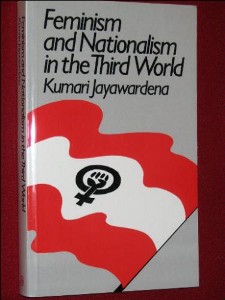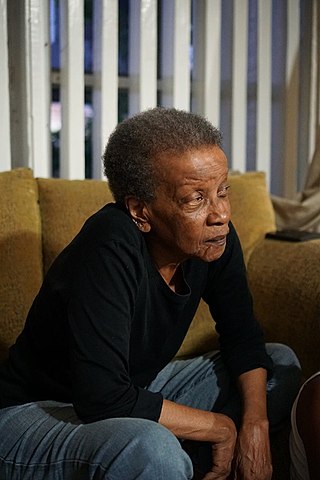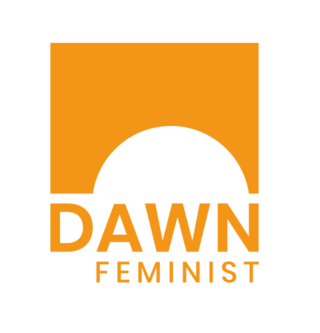
Feminism and Nationalism in the Third World is a 1986 publication by Sri Lankan author Kumari Jayawardena. Kumari's book has been described as a feminist classic and widely used in gender and women's studies to date as a primer of Third-World Feminism.
Honor Maria Ford-Smith is a Jamaican actress, playwright, scholar, and poet. The daughter of a brown Jamaican mother and an English father, Ford-Smith is sometimes described as "Jamaica white," signalling a person of mixed race who appears white.
Amy Ashwood Garvey was a Jamaican Pan-Africanist activist. She was a director of the Black Star Line Steamship Corporation, and along with her former husband Marcus Garvey she founded the Negro World newspaper.

Ecofeminism is a branch of feminism and political ecology. Ecofeminist thinkers draw on the concept of gender to analyse the relationships between humans and the natural world. The term was coined by the French writer Françoise d'Eaubonne in her book Le Féminisme ou la Mort (1974). Ecofeminist theory asserts a feminist perspective of Green politics that calls for an egalitarian, collaborative society in which there is no one dominant group. Today, there are several branches of ecofeminism, with varying approaches and analyses, including liberal ecofeminism, spiritual/cultural ecofeminism, and social/socialist ecofeminism. Interpretations of ecofeminism and how it might be applied to social thought include ecofeminist art, social justice and political philosophy, religion, contemporary feminism, and poetry.

Latin American feminism is a collection of movements aimed at defining, establishing, and achieving equal political, economic, cultural, personal, and social rights for Latin American women. This includes seeking to establish equal opportunities for women in education and employment. People who practice feminism by advocating or supporting the rights and equality of women are feminists.
The Sisterhood Is Global Institute (SIGI) is an international non-governmental organization. For almost three decades, SIGI has been a consultant to the United Nations.
Beatrice Greig was a Trinidadian writer, editor and women's rights activist in the period between 1900 and 1940. She was one of the most influential voices for women's civil, economic and political equality during this time frame. She was one of the first women to run in an election in Trinidad.
Rhoda Reddock is a Trinidadian educator and social activist. She has served as founder, chair, adviser, or member of several organizations, such as the Caribbean Association for Feminist Research and Action (CAFRA), the Global Fund for Women, and the Regional Advisory Committee of the Global Coalition on Women and AIDS established by UNAIDS. In 2002 she received the Seventh CARICOM Triennial Award for Women, was Trinidad and Tobago's nominee for the International Women of Courage Award in 2008, and was honoured in her country's National Honour Awards ceremony in 2012 with the Gold Medal for the Development of Women.
Feminism in Pakistan refers to the set of movements which aim to define, establish, and defend the rights of women in Pakistan.This may involve the pursuit of equal political, economic, and social rights, alongside equal opportunity. These movements have historically been shaped in response to national and global reconfiguration of power, including colonialism, nationalism, Islamization, dictatorship, democracy, and the War on Terror. The relationship between the women's movement and the Pakistani state has undergone significant shifts from mutual accommodation to confrontation and conflict.
Nelcia Robinson-Hazell is a Black Carib poet, community organizer and activist. She has spearheaded the development of policy initiatives throughout the Caribbean on issues regarding gender and indigenous identity. Serving as the president of the National Council of Women of Saint Vincent and the Grenadines, she began in the 1980s to change the organization toward political action. Recognizing a need to establish research on the needs of women, she was involved in the creation of both local and regional organizations to analyze and develop information about the socio-economic and political inequalities women faced. She created similar initiatives for indigenous peoples, beginning first in Saint Vincent and then expanding them regionally. Robinson has been involved in international directives including the World Summit for Social Development and the 1995 World Conference on Women, as well as follow-up conferences discussing such issues as poverty, economic empowerment and violence against women. She has served as a civil society representative on the Regional Judicial and Legal Services Commissions and as chair of the Commonwealth Women's Network.

Gema Ramkeesoon was a Trinidadian and Tobagonian social worker and women's rights activist who was one of the early pioneers of the women's movement in Trinidad and Tobago. She was honored for her social service work as a member of the Order of the British Empire in 1950 and received the gold Hummingbird Medal from Trinidad and Tobago in 1976.
The Coterie of Social Workers is a women's organization, established in 1921 in Trinidad and Tobago, British West Indies to engage in empowering women as well as providing benevolent assistance to the poor and disadvantaged. It was the first organization to target for membership, middle-class women of colour and focus on the needs of working class women, regardless of their marital status and was the leading women's organization in the country from its establishment through the 1940s. Though it has branches throughout the country, its headquarters is located at 3 Longden Street in Port of Spain.

Christina F. Lewis was an Afro-Trinidadian community worker, trade unionist and women's rights activist. Through her political activities, she worked to improve the conditions of workers and women, advocating for universal adult suffrage and for British citizens of the West Indies to have the same rights and privileges as their counterparts in Britain. As a socialist, Pan-Africanist, and feminist, she merged anti-colonial policies with the struggle for women's rights and against racism.

Andaiye, born Sandra Williams, was a Guyanese social, political, and gender rights activist, who has been described as "a transformative figure in the region's political struggle, particularly in the late 1970s, '80s and '90s".

Amina Doherty is a Nigerian/Antiguan feminist, artist and women's rights advocate. As an African-Caribbean feminist and women's rights advocate, her work is centered around raising awareness for social justice through movement-building, and innovative approaches to philanthropy and grantmaking. Amina's work takes many forms: art exhibitions, community programs, cultural events, philanthropic advising, and grantmaking initiatives.
Ewa Charkiewicz is a Polish economist, socialist feminist, and member of the Green Party. She conducts transdisciplinary research and lectured at universities in the Netherlands, the United States and India. She combines academic work with involvement in social movements.

Development Alternatives with Women for a New Era (DAWN) is a transnational feminist network of scholars, researchers and activists from the global South. DAWN works under the gender, ecology and economic justice (GEEJ) framework, which highlights the linkages between these three advocacy areas. The network offers a forum for feminist advocacy, research, and analysis on global social, political, and economic issues affecting women, with a focus on poor and marginalized women of the global South. This was a shift from the association of feminism with white, middle-class women of the global North common at the time of DAWN’s formation and into the present-day. Rafia Zakaria, author of Against White Feminism: Notes on Disruption, argues that DAWN and its empowerment approach to development offer a successful example of a bottom-up, antiracist alternative to political mobilization that decentres the whiteness prominent in dominant feminist development projects.
Sonia Magdalena Cuales was a Curaçaoan feminist activist and writer. Her work in the United Nations system and with various advocacy groups focused on the intersection of women's rights and development across the Caribbean.

The Caribbean Association for Feminist Research and Action (CAFRA) is a nongovernmental organization that advocates for women's rights and empowerment in the Caribbean. The regional network, which serves as an umbrella organization for progressive feminist groups in over a dozen countries, is based in Castries, St. Lucia.
Linnette Vassell is a Jamaican academic, writer, and feminist, who advocates for gender equity and community management of water resources.









